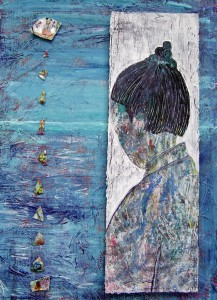
Stepping into Tranquil Resonance Studio, the hustle and bustle of Chinatown disappeared behind my back. Yellow walls, wood floor, traditional Chinese xuanzhi furniture, brush paintings, tea sets and a row of guqins (seven-stringed zithers) on the wall had the style of an old Chinese study.
David Wong, proprietor, listened to my reading of Li Po’s “Cho-Kan Hang”.
“I think the Fisherman’s Song would work well with this,” David said. He played the tune on the guqin and I read the poem again, first in Cantonese, then a translation in English by Ezra Pound with the title, “The River-Merchant’s Wife: A Letter”.
All thirty lines of “Cho-Kan Hang” were made up of five syllables. I found it binding and difficult to be expressive.
“In a ‘five syllabic finite poem’,” said David, ” expressiveness is to be derived only from the varied tone of each character.”
The fluid and irregular lines spoken by Ezra Pound’s river-merchant’s wife gave a definite contrast to Li Po’s wistful lady. Reading the poem one after the other, the character was fully realized—she might be confined within four walls, but her feelings knew no bound—by two poets centuries apart.
